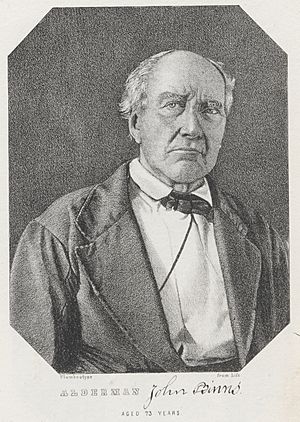John Binns (journalist) facts for kids
John Binns (born December 22, 1772, died June 16, 1860) was an important American journalist. He was born in Dublin, Ireland. His father was an ironmonger named John Binns. When he was young, John and his older brother Benjamin moved to London, England. There, they became involved in groups that wanted more democracy.
Contents
Early Life and Fight for Change
John Binns joined the London Corresponding Society (LCS). This group wanted to make government fairer for everyone. He quickly became a leader in the society. By 1795, he was in charge of their main committee. Binns wanted to gather many people to support changes in how the government worked. He believed in big changes, even a revolution.
Big Meetings and New Laws
In October 1795, John Binns and William Duane led a huge meeting. More than 200,000 people came to listen. Famous speakers like Joseph Priestley and John Thelwall also spoke. They asked for peace with France and for all men to have the right to vote. They also wanted elections every year.
A few days later, King George III's carriage was attacked on its way to Parliament. People were shouting for "No King" and "No War." The government used this event to create new laws. These laws, called the Seditious Meetings Act and the Treason Act, made it harder for groups like the LCS to meet and speak freely.
Arrests and Exile
In 1797, Binns and his brother joined a group called the United Britons. This group wanted to connect with other reform groups in England, Scotland, and Ireland. They also wanted to work with the French government. In January 1798, Binns was stopped in Dublin. He was arrested again in February while trying to go to France. He was with James Coigly, who had secret papers for the French. Binns was tried for treason but was found innocent. Coigly was found guilty and faced a severe punishment.
In 1799, Binns was arrested again while trying to restart the reform network after a rebellion in Ireland failed. He was released in March 1801. After this, he decided to move to America.
New Life in America
John Binns first lived in New York for a short time. Then, he moved to Northumberland, Pennsylvania. He joined a group of other reformers who had also moved from Europe. One of them was Joseph Priestley.
Starting Newspapers
In March 1802, Binns started his own newspaper called the Republican Argus. The newspaper's motto was: "persons not property should ever be the basis of representation." This meant he believed that people, not just their wealth, should be represented in government. The paper called for democratic changes to Pennsylvania's laws. It also supported the United States expanding its land, even suggesting taking over Canada.
In March 1807, Binns moved to Philadelphia. There, he became the editor of the Democratic Press. He ended up in a newspaper rivalry with William Duane, another former LCS member. Duane edited a newspaper called the Aurora. Binns became a trusted advisor to Pennsylvania Governor Simon Snyder. This led to a split in Thomas Jefferson's Democratic Republican party. It also encouraged attacks on "foreign extremists" by people who disliked immigrants.
Later Political Views
During the War of 1812, Binns worked as an assistant to Governor Snyder. His newspaper, the Democratic Press, became very popular by supporting America against Britain. However, in the late 1820s, his newspaper lost readers. This was because Binns strongly criticized Andrew Jackson, a popular leader. Binns called Jackson a bad leader and blamed him for the deaths of some soldiers. Binns supported the Whig party, which disagreed with trying to turn poorer people against richer people. The Democratic Press stopped publishing in 1829.
Slavery and Irish Americans
During a big disagreement in 1832 about states' rights, Binns suggested a new idea. He proposed that the government should buy the freedom of enslaved people. He also thought that these freed people should be sent back to Africa. Even though he had some enslaved people working for him, Binns suggested this plan.
Daniel O'Connell, a famous Irish leader who helped Irish Catholics gain more rights, was strongly against slavery. Binns, however, thought that Irish Americans should avoid the issue of slavery. He believed it would cause more problems for them in America. Archbishop John Hughes of New York agreed with Binns. In 1841, he told Irish Americans not to sign O'Connell's anti-slavery petition. He feared it would increase anti-Irish feelings. Throughout the 1840s, Binns defended the Irish community in Philadelphia from unfair attacks. He also protected them from groups like the Know-Nothing party in the mid-1850s.
Published Works
In 1840, Binns published a book about Pennsylvania law called Binn's Justice. This book was very popular and had many editions, with the last one coming out in 1912. In 1852, with help from Thomas D'Arcy McGee, Binns wrote History of the Irish settlers in America.
Family Life
In 1806, John Binns married Mary Anne Bagster. They were married in the Church of the United Brethren. Together, they had ten children. John Binns passed away in Philadelphia on June 16, 1860.
 | William L. Dawson |
 | W. E. B. Du Bois |
 | Harry Belafonte |


